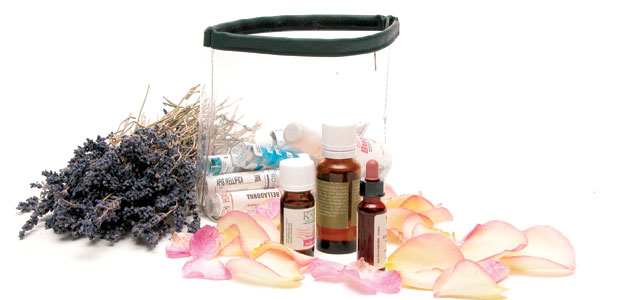Advertisement
Aromatherapy Apothecary
Therapeutic essential oils have a well-deserved place in your first aid kit or home apothecary. They are powerful botanical medicines that can fight fungi, bacteria, viruses, and inflammation. They can also help to manage stress and promote relaxation. When you are collecting essential oils for first aid use, think in practical terms. To help you … Continued

Therapeutic essential oils have a well-deserved place in your first aid kit or home apothecary. They are powerful botanical medicines that can fight fungi, bacteria, viruses, and inflammation. They can also help to manage stress and promote relaxation.
When you are collecting essential oils for first aid use, think in practical terms. To help you determine which oils you need and how you might use them, here are the healing properties of the essential oils that are most useful in your first aid kit.
Tea tree (Melaleuca alternifolia)
Tea tree oil is first aid in a bottle! It disinfects and has powerful antiseptic and immune stimulating properties and is non-toxic and non-irritating. It can be placed directly on cuts and scrapes to clean, disinfect, and reduce pain. Use tea tree for fungal infections, blisters, athlete’s foot, burns, cold sores, infected wounds, insect bites, rashes, and warts. Use it directly on skin or with a carrier.
Lavender (Lavandula angustifolia)
Lavender’s properties help heal and clean wounds, prevent bruising, soothe headaches, and take the itch out of stings and rashes. It is an exceptional remedy to use on burns, cuts, and stings. Lavender’s healing and antiseptic properties stop pain and speeds skin’s healing process. Its analgesic properties help soothe tired, sore muscles and the inflammation caused by insect bites. Lavender helps the mind and body and so aids sleep and benefits the immune system. Avoid during the first trimester of pregnancy.
Camomile (Matricaria recutita)
Camomile can be applied in a cold compress for burns, rashes, and skin irritations. Because it is calming and promotes restful sleep, camomile is a traditional medicine for children. It also helps with impatience, tension, and insomnia. Camomile is good for headaches, insomnia, abscesses, allergies, boils, burns, inflammation, rashes, and wounds. Emotionally it can be balancing, calming, and soothing.
Eucalyptus (Eucalyptus globules)
Considered the oil of respiration, eucalyptus is best known as a decongestant for coughs and colds. It is a powerful bactericidal with antiviral properties. Eucalyptus is an excellent immune-stimulant and good for people who are tired, run down, and prone to frequent colds. Eucalyptus can be used in a bath or massage for sore muscles, aches, and pains. However, pregnant women, epileptics, and those with high blood pressure should avoid eucalyptus.
Peppermint (Mentha piperita)
Peppermint’s analgesic properties make it useful for treating headaches. It is stimulating and penetrating and clears the head while soothing the emotions. It is also excellent for sore, tired feet. Peppermint can be used topically for aches and pains, acne, dermatitis, ringworm, scabies, and in a diffuser for fatigue, headaches, migraines, bronchitis, sinusitis, and spasmodic cough. Avoid during pregnancy and nursing and do not use with children under 30 months. Also do not use peppermint if you are taking homeopathic remedies.
Include these essential oils in your first aid kit along with an array of ointments, bandages, cotton wipes, and an eye wash cup. Then make up the recipes that accompany this article and add them to your kit. You’ll be prepared for anything.
Camomile Cold Compress
A cold camomile compress can be used topically to remove excess heat from the body and is useful for treating inflammation and swelling.
2 drops camomile
2 drops lavender
2 cups (500 mL) cold water
In a large bowl add essential oils to water and stir to help oils disperse. Soak cotton in water and gently squeeze out excess. Place on affected area. Repeat as often as needed or until heat dissipates from inflamed or swollen area.
Anti-Itch Spray
For 125 mL bottle
Spray this combination of essential oils on itchy skin as needed.
2 Tbsp (30 mL) witch hazel
25 drops lavender
15 drops eucalyptus
4 drops peppermint
1/2 cup (125 mL) minus 2 Tbsp (30 mL) distilled water
Add essential oils to the witch hazel, mix, add water, and pour into spray bottle. Shake before use.
Antiseptic Soap
For 125 mL bottle
Keep hands clean with this essential oil mixture.
1/2 cup (125 mL) minus 2 Tbsp (30 mL) unscented liquid soap
20 drops tea tree
10 drops lemon
15 drops lavender
Add essential oils to unscented soap and shake to combine.




